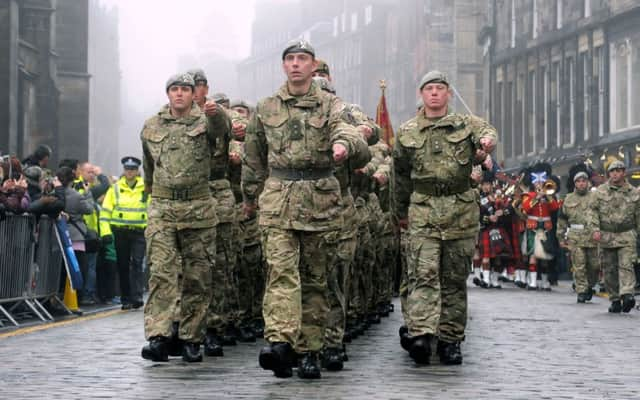Armed forces veterans have much to offer in community


‘As well as doing a superb job of protecting our freedom around the world, the Armed Forces are perhaps the biggest and best training and apprenticeship scheme we have and a remarkable engine of social mobility.” (Lord Ashcroft, presenting his Veterans’ Transition Review, February 2014).
With 30 plus years experience in the military, I couldn’t agree more; but if veterans have so much to offer, how is it that so many are struggling to build meaningful productive lives and end up homeless, abusing drugs and alcohol or in the criminal justice system? The costs of poor transitions to civilian life are high; both to the individual and to communities, estimated at £114 million each year .
Advertisement
Hide AdAdvertisement
Hide AdThe last ten years have seen a phenomenal transformation in public attitudes to the armed forces. The 1970s, ’80s and ’90s were dominated by security awareness, and service personnel did not routinely wear uniform in public. The consequence was to remove the military from public view and two generations grew up without understanding the concept of a military covenant. It is a different story today. The catalyst for this change was, of course, the very obvious hardships, trauma and suffering caused to service personnel and their families as a result of the wars in Iraq and Afghanistan. But it has also served to highlight the difficulties experienced by many service leavers, not just those who have experienced physical or emotional trauma during their service. Indeed, pretty much all men and women leaving the military need some assistance with the adjustment process. I am speaking from experience. Some need significantly more support, but that does not mean they have less to offer.
Everyone understands that life in the military is different. Young people joining the military get intensive induction and training. Doctrine and drills become second nature and individuals are welded into an effective fighting force, underpinned by relevant service and regimental cultures and the building of loyalty to Queen, country, regiment, sub-unit and comrades (not necessarily in that order). Some basic freedoms are, of necessity, surrendered – restrictions on personal choice and acceptance of a strict disciplinary code for instance; in return for which, the service looks after key needs in a highly-structured environment.
The process of returning to civilian life is not always so comprehensive. It is therefore not surprising that those with lower reserves of resilience as a result of their life experiences before and/or during their service, struggle with that process; unable to see their experiences and skills as transferable and feeling they have nothing to offer. Critically, they no longer have the camaraderie and small-group cohesion which shielded them from other stresses – without skills and experience to build positive, nurturing relationships in civilian life. This is compounded in the community if there is little or no first-hand experience of service life, with low levels of empathy and understanding of what veterans have experienced and, crucially, what they have to offer. It is this latter point, about leveraging the untapped skills and abilities veterans possess, which deserves more attention and support.
At Venture Trust, we help people leading disengaged and chaotic lives to acquire the necessary skills to understand their potential and how to build positive relationships. Working in partnership with Scottish Veterans Residences, we co-delivered a pilot programme to support some veterans finding their way after the military. The results were extremely positive; typically, participants regained motivation, re-engaged with family, adopted healthier lifestyles, accessed support services and so on. However, as is often the case, it is the softer outcomes which are most interesting. Very quickly, the veterans developed an empathy with their fellow participants, young people who were homeless or in the criminal justice system, and crucially, used their greater experience and acquired life skills to help support them. We are currently building on our experiences, designing a programme specifically geared to veterans, with an employability and wellbeing focus, which will also offer individuals an opportunity to train as mentors and be matched with other Venture Trust participants, living in their local community. Working together, drawing on the benefits of creating supportive relationships, where veterans can share the wealth of their experience in encouraging young people in their development and in reaching their goals. The potential benefit for veterans is also significant – a morale boost, a chance to contribute and in turn support their own transition. In this particular case, it would be a win-win for communities.
So, for those individuals and organisations in communities keen to help veterans with their transitions, ask not only what you can do for the veterans in the community, but consider what veterans can do for you.
• Mark Bibbey is chief executive of Venture Trust
SEE ALSO